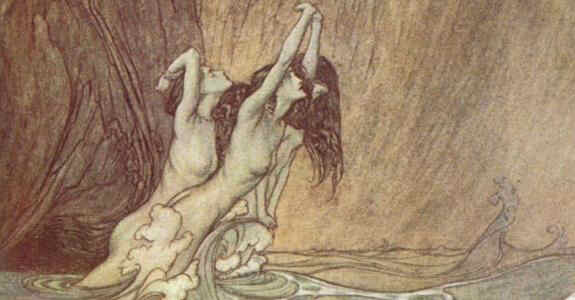Canto IV of Paradise
 |
|---|
Spirits who had missed their vows.
Oh sweetheart of the celestal Lover!
Intra due cibi, distanti e moventi d'un modo, prima si morria di fame, che liber'omo l'un recasse ai denti; sì si starebbe un agno intra due brame di fieri lupi, igualmente temendo; sì si starebbe un cane intra due dame: per che, s'i' mi tacea, me non riprendo, da li miei dubbi d'un modo sospinto, poi ch'era necessario, né commendo. Io mi tacea, ma 'l mio disir dipinto m'era nel viso, e 'l dimandar con ello, più caldo assai che per parlar distinto.
RETURN TO THE PORTAL OF PARADISE
Although free to choose between two ladies of equal beauty, man would die of hunger not to know which one to put under his tooth. My silence could be explained thus, by the doubts that furnished my spirit; to choose between two ideas, Jeanne, then, understood my dilemma and says to me: "I see well how attracts you one and the other desire, which prevents your thought to expressed itself. You are right to question yourself, namely, if your theory which wants that, the conscience of the souls returns, after death, to the universal consciousness, to be redistributed in a random way in the soul of a new-born baby; but I beg you, my tender Marco, to move away from this imaginary believe, because it is not supported by the faith nor by me, who, as you see it, carries in me, the conscience, the same one, that I transported, still alive, in my beautiful body of young girl, protected by a strong armour, to defend France and this same faith. But here is, that arises at your spirit, another difficulty which you could not solve yourself, namely, how is it that one is guilty of an evil which results from the violence of others? I made you understand, that a blessed soul could not make a fault to avoid another one. It happens that one has to do, against his will, what would not have to be done to avoid a greater danger, and I want you to think that the will and the constraint are mixed, and make that your faults cannot be excused. You saw very well that Marguerite was trading her body, you know well that she makes a fault then. Unless you tell me that she rather made an act of Charity. If this is how she says it, on what count do we agree with that statement, if not that she had satisfied, for a while, the desires of a pilgrim of passage. But You, who was fond of such pilgrinages, you know very well that this pilgrim of passage had, for this act, made himself a fault, while using of an illicit trade, or by misleading his wife or his beloved; how then, could one speak of a charitable act, and thus excuse the fault of Marguerite? Unless you tell me, still, you, who would like to defend the raison d'être of these places, that she makes, thus, an act of Charity, if the pilgrim by his act, is thus delivered from the torments, that his desires gave birth to, in him, and who could, without the charitable act, have lead him to kill his wife or to rape another one. Then so, the act of Marguerite, indirectly and without her being conscious of it, would have avoided a bad act and would have, in that, be a good action; but still there, would it have been necessary, that she knew about it, and that she had been conscious of the benefit of her act? What is it then, about Prudence, who did not want it that way, and who, under constraint, she came to the point of trading her body while saying to preserve her soul intact? Should we have, according to you, who has no other reason to frequent these cloisters, exonerate the acts made by her in the name of this premise, without also exonerating that of Marguerite, whereas their consequences have the same effect on those who profits from them? Unless the act of Prudence, could be excused by the objective purity of whom gives it, and not that of Marguerite; what would induce that sin, can be judged according to the condition of the One who provides it?" Such were the words of Jeanne, which filled me with joy, to realise why, my mistresses, had their place in the Paradise of the Good Ladies. And I said to her: "Oh sweetheart of the Celestial Lover! oh you divine, whose words comfort me and give me my life back! As deep as is my love for you, I am unable to pay you back the price of it, but Whom who loves you as much as I love you, pay you my debt towards you." Jeanne looked at me with her divine eyes, sparkling with love, so that my faculty of seing was overcomed; I remained, my glance, lowered, lost.
Marco Polo ou le voyage imaginaire (La tragédie humaine, janvier 2000) © 1999 Jean-Pierre Lapointe
Theme musical: Estudos Brasileiros de Cacilda Borges Barbosa, emprunté aux Classical Midi Archives.
Important Notice: any photos, fragments of photos or midi files subject to copyright will be removed on notice.